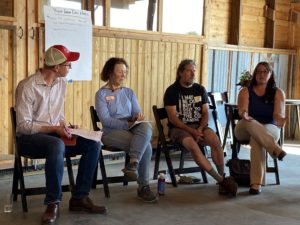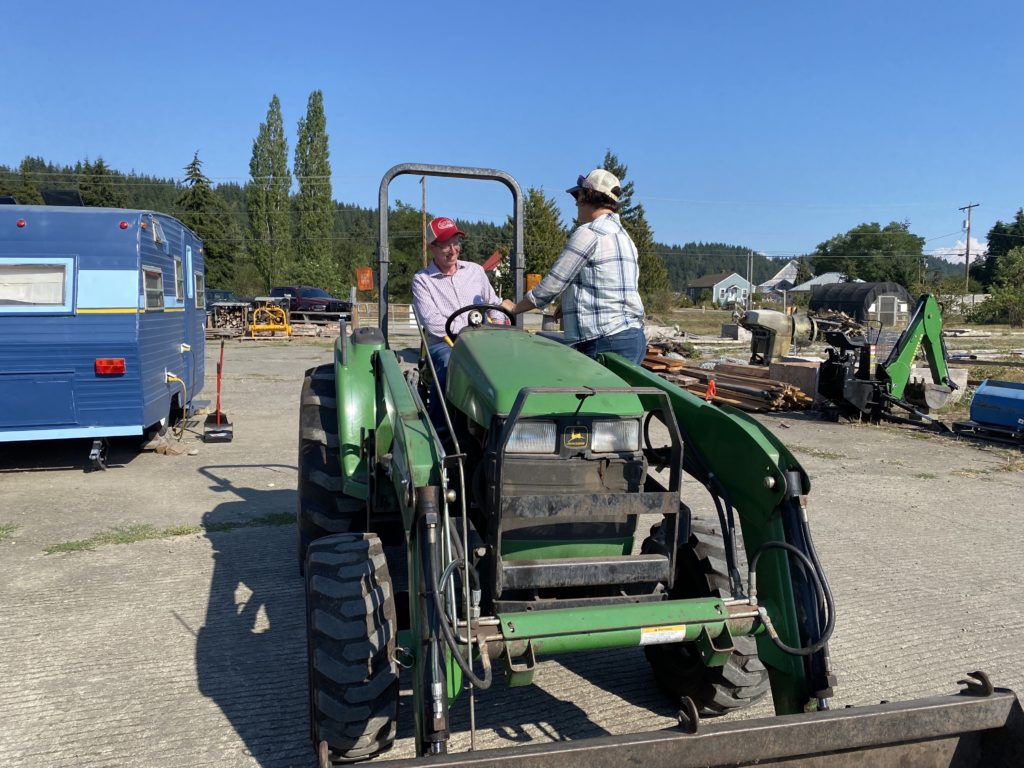
“What keeps you up at night?” Rep. Derek Kilmer asked 35 farmers and members of the Olympic Peninsula agricultural community gathered at Finnriver Farm & Cidery in Chimacum, WA, on August 24. They took the time to share their needs as Congress begins talking about the 2023 Farm Bill, the federal legislation that funds US Department of Agriculture programs and is renewed every five years. Climate impacts and economic issues unique to farmers were the prominent issues raised in a Town Hall style event hosted by Organic Seed Alliance.
Rep. Kilmer opened the session thanking the farmers for what they do, “for being part of our economy.” The Congressman, first elected in 2012, has centered serving his Washington District 6 constituents on “how to make more economic opportunity for people.” He acknowledged that the last few years have been challenging due to COVID-19, workforce and supply chain issues, and climate impacts. The Inflation Reduction Act, recently signed into law, may help. Rep. Kilmer described it as the most significant federal climate change effort and one that “acknowledges that your industry is part of the solution.” The Olympic Peninsula, with its limited economic resources, qualifies for significant economic programs in the package, he noted.
Rep. Kilmer highlighted priorities for this new round of Farm Bill funding, including food security, climate resilience, and strengthening the organic program. He then invited farmers to share the issues on their minds, summarized below:
- Increasing supply chain costs, including organic poultry feed and fuel
- Support to electrify farm vehicles and make farms more energy efficient
- Technical assistance for grants and support to organize farmer co-ops to build support systems
- Investments in BIPOC-led technical assistance and training
- Consistent funding for school gardens on a scale that supports school food service
- Support for public school agriculture programs in counties like Jefferson that are becoming the “breadbasket” of a region undergoing excessive development
- More funding for schools to purchase food from local farmers; for local farmers to donate to food banks, and to increase SNAP
- Farmland preservation and farmland affordability for young farmers
- Changes in zoning and financial rules so that it is easier for farm owners to refinance the land they live on because “everyone else can leverage their real estate investment; farmers can’t”
- Developing federal loan programs for farmers so they are not at the mercy of private lenders
- Easing rules and creating incentives for farmers to build “tiny homes” for their staff and as an affordable housing solution
- Support for young farmers who struggle day-to-day with a cost of living that far exceeds their wages; fund farm business training programs
- Resources for farmers to deal with climate impacts; support for regional plant breeding
- Support for our federal seed banks
- Prioritizing water supply assessments to ensure our food keeps growing as the climate changes
- Rewarding farmers for sustainable practices by covering their certification costs
- Support USDA efforts to address seed industry consolidation and intellectual property restrictions
- Fund cooperative models to improve land access; encourage longer leases to create an incentive to invest in the land; models to protect land for ongoing stewardship without pressures from the real estate market
- Support the Agricultural Resilience Act (HR2803) to mitigate climate change, conserve land, and provide the research and technical assistance needed to make food systems sustainable
Rep. Kilmer affirmed each farmer’s needs and pointed to some current programs that could help (e.g., Inflation Reduction Act provisions for electric vehicles and land conservation) while noting the need for additional support.
After the substantive discussion and as farmers returned to their fields, Rep. Kilmer took OSA’s Laurie McKenzie up on her offer to safely learn a key farm skill: how to drive a tractor!
The OSA team is grateful for the support of Finnriver Farm & Cidery, who provided space for the listening session, and to local partners for outreach support that resulted in a well-attended and meaningful community conversation.

